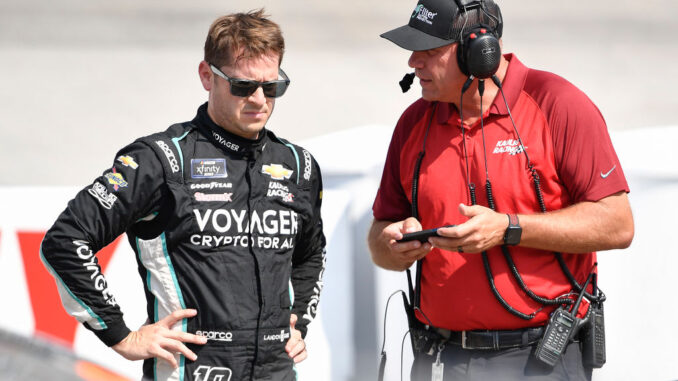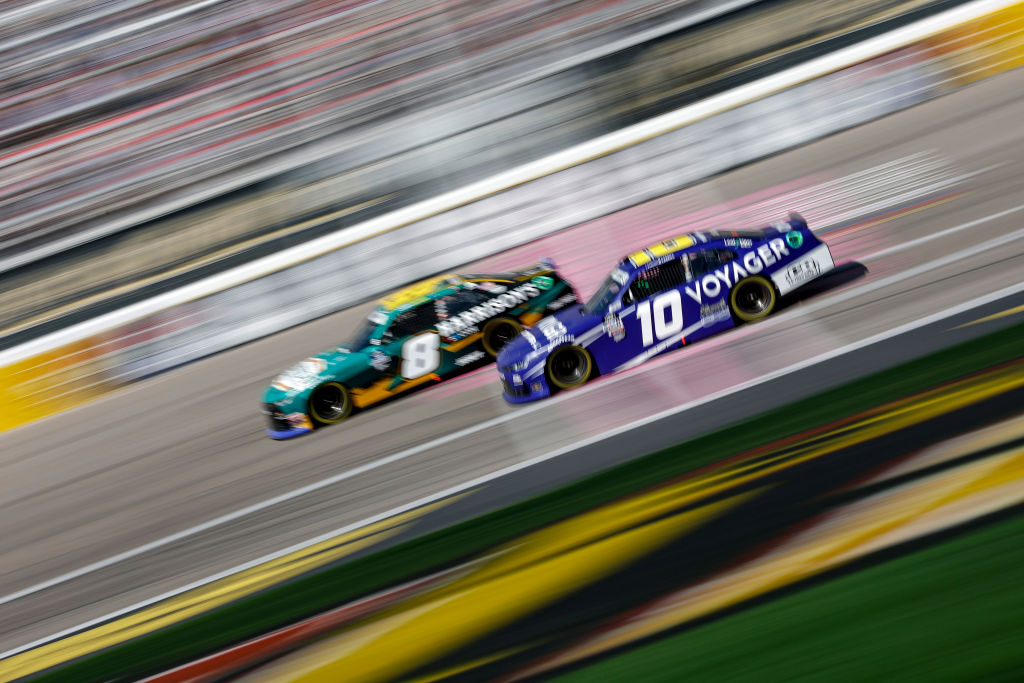
Getting paid in Bitcoin hasn’t paid off for Landon Cassill. He’s now agreed to settle all claims against him for promoting a cryptocurrency exchange token that cost millions their money.
Though the exact terms of the settlement are confidential, $1.7 billion was lost by Voyager Digital customers in total. Thanks to changing federal law, Landon Cassill is on the hook for some of that money.
“I’m glad this case was amicably resolved and am sorry that so many other people also lost money with Voyager,” Cassill said.
The deal started midway through the 2021 Xfinity Series season when Landon Cassill announced a new sponsorship deal with cryptocurrency exchange Voyager. Cryptocurrency sponsorship was not new to NASCAR at that point, but this one featured a twist on the standard sponsorship model: he was paid entirely in Bitcoin and other cryptocurrencies.
In addition to running the Voyager name on his JD Motorsports and Kaulig Racing Chevrolet Camaros over two seasons, Cassill personally endorsed the company’s exchange token VGX. Indeed, as CupScene editor-in-chief Greg Engle pointed out on Forbes, the sponsorship itself came about on Cassill’s suggestion after he met and befriended the founder of Voyager at a crypto conference.
“There’s a handful of drivers that are into crypto, but I’m probably one that’s been in it for long enough that’s I’m pretty comfortable with how it works,” Cassill said at the time.

The deal certainly seemed like a good one in the short term. Voyager’s fortunes and finances were on the rise. Unfortunately for Cassill, though, the company’s fortunes didn’t last long.
The high growth was largely because of risky business practices like large loans to high-risk companies that the Commodities and Futures Trading Commission (CFTF) called “reckless.”
The CFTC and Federal Trade Commission (FTC) found that CEO Steve Ehrlich broke derivative rules and lied about customer funds. Voyager was forced to declare bankruptcy after the Securities and Exchange Commission (SEC) and state regulatory authorities demanded the company stop selling crypto tokens and interest accounts.
Compounding the company’s issues, they agreed to a buyout by well-known cryptocurrency exchange FTX, which itself collapsed not long after agreeing to make the purchase. FTX founder Sam Bankman-Fried is currently on trial for fraud. All that left Voyager fully out of luck and millions of users out of money.
Embittered customers are going after the celebrities who endorsed the companies. The Court of Appeals decided last year in Parks v. BitConnect that endorsing and promoting cryptocurrencies to the public at large can result in personal liability.
“When a person solicits the purchase of securities to serve his…financial interests, he is liable to a buyer who purchases those securities—whether that solicitation was made to one known person or to a million unknown ones,” the decision read as cited by the Moskowitz Law Firm, which represents the victims in a series of class-action lawsuits against crypto companies.
“The good news for victims is we are hearing from more crypto promoters each day who want to start mediation, now that they realize the actual law on this specific issue,” said Adam Moskowitz, of The Moskowitz Law Firm, who was appointed Co-Lead Counsel with David Boies against FTX, Voyager, and Binance.
Football player Trevor Lawrence is another notable celebrity to have settled the claims against him, in his case from promoting FTX. Cassill is the first celebrity to settle specifically in the Voyager case.
Other celebrities who are currently named in a class-action lawsuit against Voyager and others include Mark Cuban and Rob Gronkowski. These were intentional deals to promote trust in crypto by associating it with a familiar face.
“When people hear something from Gronk, they know they’re getting the real deal,” said Steve Ehrlich, Voyager CEO, when that deal was announced. “We also know that by working with Gronk, we are going to get our message out there and have a lot of fun.”

The good news for NASCAR is that, though other drivers and teams have driven cars with crypto sponsorships, current lawsuits are only targeting celebrities who explicitly endorsed the product, not just those who took money from it.
That includes a Dogecoin sponsorship for Josh Wise and an attempt from Brandon Brown to run an LGBCoin sponsorship, which was denied by NASCAR for its political message.
Additionally, outside of NASCAR, Rinus Veekay ran a Bitcoin-sponsored car in the 2021 Indianapolis 500, putting the most-established cryptocurrency on its largest motorsport stage yet.
While the cryptocurrency industry offers big money to NASCAR teams that need funding now more than ever, Landon Cassill offers a cautionary tale that endorsing companies with dubious business practices can have legal consequences. The law will continue to develop, even outside of NASCAR and the sports world, as this new technology becomes more entrenched.
- Denny does Dover after surviving hard-charging Kyle Larson to tame the Monster - April 28, 2024
- The Monster Mile brings short track style to high banking - April 25, 2024
- Sam Mayer scores Xfinity win by an inch in photo finish at Texas - April 13, 2024